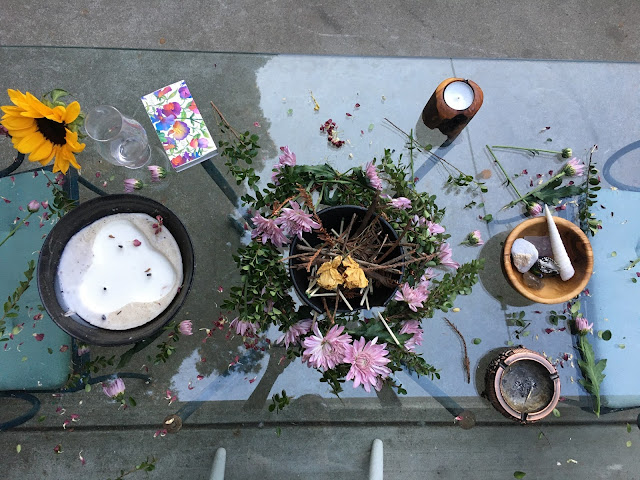One year of paganism.
A year ago I decided to start practicing paganism. I began with researching Lughnasadh, and designed a simple ritual that I felt combined some aspects of traditional practice with my own invention in a way I was comfortable with. It was not my first time I acted on the desire to acknowledge an earth-centered holiday; a year or two back I had burned a small fire and sung a song on Winter solstice. But this was my first time coming to a ritual with the intent to craft a kind of practice for myself, and to do so consciously embracing some sort of paganism.
So much researching, experimentation and exploration has happened in this past year. I’ve learned a massive amount about Norse and Germanic paganism, and began reading some of the best primary sources we have for this history. I began a book series — which for me, is notable because I rarely read fiction — to spend even more imaginative time there. I’ve learned to mark memories based on the full moon, and I’ve spent hours in my new backyard staring at plants and flowers. I had an unexpected spiritual experience while digging a hole for a sunflower patch. I made flower crowns and garlands; I’ve bought statues of Freya and Odin and built them altars with candles, stone and wood. I learned about the runes and started experimenting with incorporating them into my garden and my practice. I designed and redesigned rituals for Samhain, Yule, Beltane, and Litha. I spent hours diving into a Wikipedia rabbit hole discovering Celtic gods, Germanic gods, Slavic gods. I learned about the famous burial site of the Birka female warrior, and I printed out the sketch of her grave and framed it so I can honor her in my thoughts. And this is just a partial list.
But by far the most important discovery was the existence of a network of people who call themselves atheopagans, or naturalistic pagans. I think this may have saved the entire endeavor for me; because without a community with whom I could share and exchange ideas, thoughts and reflections about what it means to be pagan without believing in the supernatural, I doubt I would have been confident enough to forge that path entirely alone. It’s a weird place to be; in-between two worlds where you offend believers and befuddle skeptics, and thinking I was going it alone made me doubt myself and whether or not what I was attempting was ridiculous or simply impossible. And then boom — within the space of an afternoon a single hashtag on Instagram led me to discover an entire world of non-theist pagans practicing, writing, gathering and creating this way of interfacing with religion and the world. It made every single difference.
Having my instincts validated finally allowed me to think more clearly — because without so much self-doubt — about how paganism provides me with a framework with which I can contemplate, recognize, and celebrate my experience of being alive. There’s little that is fundamentally important to me that paganism doesn’t provide me with a way to engage. My love of animals. My desire for connection to the distant past. My historical curiosity about that past. My reverence and awe for the mystery of the human mind. My joy for movement, dance, and physical exertion. My embrace of overwhelming emotional experience and my Dionysian desires. My beliefs about life and death. Even my anarchist political values.
Of course, none of this comes pre-packaged as some perfect fit which requires no interpretation; no religion does. And the pagan world of the past was by no means some kind of egalitarian paradise; along with the smaller scale societies that I think humans do best in, it was also a world rife with hierarchy and brutal violence. But this is one of many reasons why contemporary paganism is necessarily such a diverse and eclectic world — it requires interpretation, reconstruction, and invention. Again, the atheopagan community was, for me, absolutely crucial here. When I filled out the request form to join the Facebook group, it made clear the explicit anti-racist, anti-sexist, and anti-imperialist politics of the community. So not only would I be able to connect to people who share my beliefs and feelings about the physical world but, even more importantly, my political values.
So here we are, forging some kind of blossoming, curious, hopeful religious practice that is unfolding in front of our eyes. On the precipice of making the earth an increasingly difficult home for humans to inhabit, it is a strange time to practice a spirituality based precisely on that planet, so full of foreboding and uncertainty we are as we try to imagine what kind of future is in front of us. Because whatever happens to the earth, happens to us. Such is the utterly bizarre position of being human; conscious matter, a part of the universe experiencing itself. But therefore, in turn, so small a part of something so unfathomably huge. What a fucking miracle to get to gaze at it, eyes wide open —for even the fraction of a second that are our lives in the history of it all.





What a lovely post! I am so happy you are a part of our community!
ReplyDelete